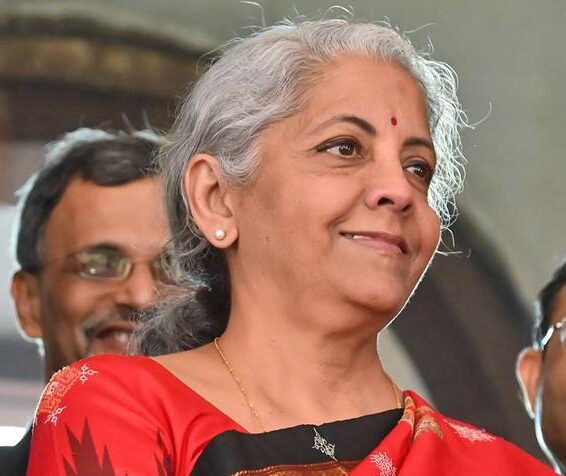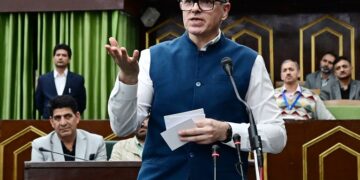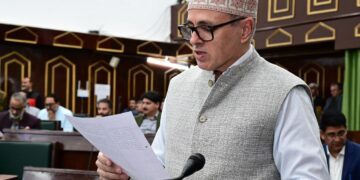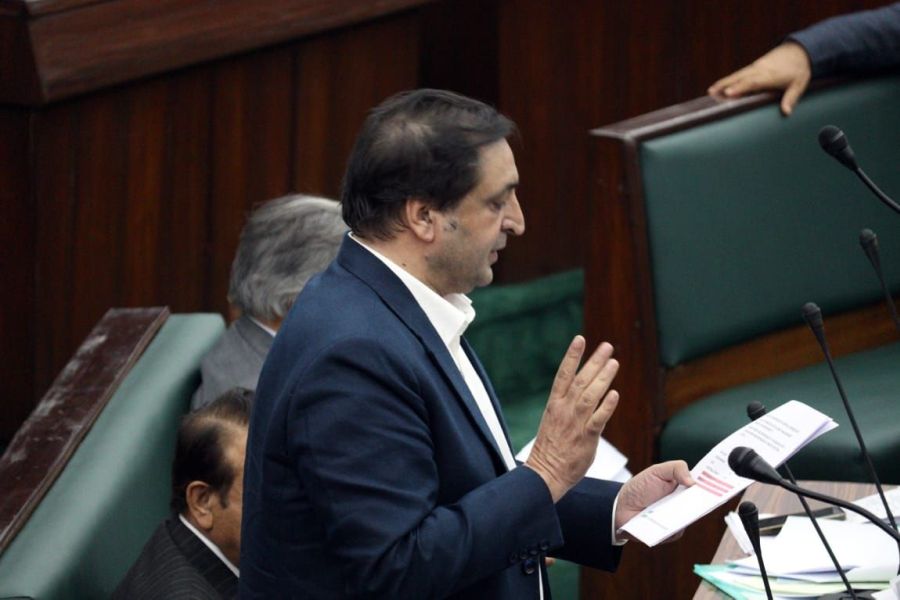New Delhi: Finance Minister Nirmala Sitharaman on Tuesday announced a marginal income tax relief for the middle class, a Rs 2 lakh crore outlay for job creation schemes over the next five years and a spending splurge for states run by parties that are needed to keep BJP in power as she unveiled Modi 3.0 government’s first budget after the general elections.
With rural distress and unemployment being blamed for BJP losing its majority in Lok Sabha, forcing it to rely on partners to form government, Sitharaman in her seventh straight budget provided Rs 2.66 lakh crore for rural development and maintained spending on long-term infrastructure projects at Rs 11.11 lakh crore to boost economic growth.
She scrapped the ‘angel tax’ that was imposed on investors pumping money into startups, cut import duty on mobile phones and key parts to benefit firms like Apple, slashed customs duty on gold and silver to curb smuggling, and made significant changes in capital gains tax. She, however, raised the securities transaction tax (STT) on futures and options of securities, which disappointed the markets.
“India’s economic growth continues to be the shining exception (in a world that is gripped by policy uncertainties) and will remain so in the years ahead,” she said. “In this budget, we particularly focus on employment, skilling, MSMEs, and the middle class.”
The centrepiece of the over Rs 48 lakh crore budget are employment, internship and skilling schemes, aimed at creating job avenues for the largest youth population in the world.
Besides Rs 2 lakh crore provided over a five year period for schemes and initiatives to facilitate employment, skilling and other opportunities for 4.1 crore youth, “I have made a provision of Rs 1.48 lakh crore for education, employment and skilling,” she said.
For Bihar, where assembly elections are due next year, the finance minister announced spending of Rs 60,000 crore on infrastructure projects like expressways, power plant, heritage corridors and new airports.
The support to Bihar, whose ruling party and BJP’s partner JD-U has been demanding an economic package and special category status for the state, is in the form of capital projects but not subsidy or cash dole.
Similarly, for Andhra Pradesh, whose ruling TDP recently joined BJP-led NDA, she allocated Rs 15,000 crore in financial aid through multilateral agencies. A similar request for support to Bihar will be expedited, she said.
For the middle class, she raised standard deduction — a flat deduction from total salary earned by an employee in a year before calculating applicable income tax rate — by 50 per cent to Rs 75,000 and tweaked tax slabs for taxpayers opting for the new income tax regime.
This will lead to taxpayers under the new tax regime — which offers lower rates of taxes but permits limited deductions and exemptions — saving up to Rs 17,500 in tax annually, she said.
Commenting on the budget, Prime Minister Narendra Modi said it “will act as a catalyst in making India the third-largest economy in the world (from fifth largest today) and will lay a solid foundation for a developed India”.
Modi lauded the budget’s sharp focus on the youth, backward sections, women and middle class as also on manufacturing and infrastructure sectors, and asserted that the proposed employment-linked incentive schemes will create crores of new jobs. “This visionary budget will uplift and empower every stratum of our society, paving the way for a brighter future for all”.
The employment-linked incentives and internship programmes were first mooted by the opposition Congress party in its election manifesto.
In its comments on the budget, the party called a two-tax system for individual taxpayers as well as the changes in the long-term capital gains tax have created confusion.
Moody’s Ratings said the budget for fiscal 2024-25 maintains the fiscal consolidation path announced in the interim budget.
To spur employment, the budget provided for incentives for companies, including paying for one-month salary for first-time employees, incentive at specified sale to both employee and employer with respect to their retirement fund contributions in the first four years of employment, and reimbursing employers up to Rs 3,000 per month for two years towards EPFO contribution of each additional employee.
Also, a programme to improve skills as well as internship for students and subsidised loans for higher education will be provided, she said.
India’s official unemployment rate in urban areas is pegged at 6.7 per cent but private agencies put it at much higher levels.
The increase in benefit for employer’s contribution towards NPS under new tax regime from 10 per cent to 14 per cent for non-government employees provides an avenue for tax saving for salaried employees.
Buoyed by robust tax collections and a higher-than-expected dividend receipt from the Reserve Bank, Sitharaman said the government’s fiscal deficit — the difference between the total revenue earned and total expenditure — will be trimmed to 4.9 per cent of the GDP in 2024-25, below the 5.1 per cent figure estimated in the interim budget she presented in February.
She reduced gross market borrowing marginally to Rs 14.01 lakh crore.
The Budget for 2024-25 fiscal (April 2024 to March 2025) allocated Rs 1.52 lakh crore for agriculture and allied sectors, aid for building 3 crore affordable housing units in urban and rural areas, provided credit support to small and medium businesses, raised small loans to Rs 20 lakh for small business, proposed setting up 12 industrial parks, and provided for setting up a Rs 1,000 crore venture capital fund for space sector.
Cut in tax rate for foreign companies from 40 per cent to 35 per cent, increase in the capital gains tax on listed securities, abolition of Angel tax, taxation of buybacks in the hands of the recipient and withdrawal of 2 per cent Equalisation Levy are other big big-ticket items announced.
Tax rate for listed equity share and equity oriented mutual funds has been increased from 10 per cent to 12.5 per cent while the exemption limit being raised from 1 lakh to 1.25 lakh. Other long term capital assets like gold, property which were taxed at 20 per cent with indexation, the tax rate has been reduced to 12.5 per cent but indexation benefit has been removed.
So far as short-term capital gain for STT on paid equity shares and equity oriented mutual funds is concerned, tax rate has been increased from 15 per cent to 20 per cent.
It is proposed to allow credit of Tax Collected at Source (TCS) while computing the amount of tax to be deducted on salary income.
Govt to undertake comprehensive review of Income Tax Act: FM
The government on Tuesday announced that it will undertake a comprehensive review of the Income Tax Act to make it easy to read.
Presenting the Union Budget for 2024-25, Finance Minister Nirmala Sitharaman also said the government will come out with SoP (standard operating procedure) for TDS defaults and simplify and rationalise compounding of such offences.
She added that two tax exemption regimes for charitable trusts will be merged into one.
Also, 58 percent of corporate tax has come from simplified tax regime in FY23.
More than two-thirds of individuals availed of the new income tax regime, Sitharaman said in the Lok Sabha.
The FM further announced that DPI apps will be developed for credit, e-commerce, education, health, law, MSME service delivery, and urban governance.
FM lists 9 developmental priorities in 83-minute Budget speech
In her 83-minute Budget speech, Finance Minister Nirmala Sitharaman on Tuesday highlighted the nine priorities for creating ample opportunities, spanning from employment to energy security to next-generation reforms.
Draped in an off-white coloured Mysore silk saree with a purple-golden border, Sitharaman opened her tablet PC that was wrapped in a red-coloured ‘bahi-khata’ style pouch and started the speech with “Hon’ble Speaker, I present the Budget for 2024-25”.
She said the people of India have reposed their faith in the government led by Prime Minister Narendra Modi and re-elected it for a historic third term under his leadership.
“We are grateful for their support, faith and trust in our policies. We are determined to ensure that all Indians, regardless of religion, caste, gender and age, make substantial progress in realising their life goals and aspirations,” the minister said.
Referring to her interim budget presented in parliament in February, Sitharaman emphasised the need to focus on 4 major castes, namely ‘Garib’ (Poor), ‘Mahilayen’ (Women), ‘Yuva’ (Youth) and ‘Annadata’ (Farmer).
For Annadata, “we announced higher minimum support prices a month ago for all major crops, delivering on the promise of at least a 50 per cent margin over costs. Pradhan Mantri Garib Kalyan Anna Yojana was extended for five years, benefitting more than 80 crore people”, she said.
On the full budget, she said it particularly focuses on employment, skilling, MSMEs, and the middle class.
She announced the Prime Minister’s package of 5 schemes and initiatives to facilitate employment, skilling and other opportunities for 4.1 crore youth over a five-year period with a central outlay of Rs 2 lakh crore.
This year, Sitharaman said, the government has made a provision of Rs 1.48 lakh crore for education, employment and skilling.
“The people have given a unique opportunity to our government to take the country on the path of strong development and all-round prosperity.
“In the interim budget, we promised to present a detailed roadmap for our pursuit of ‘Viksit Bharat’. In line with the strategy set out in the interim budget, this budget envisages sustained efforts on nine priorities for generating ample opportunities for all,” she said.
The nine priorities are Productivity and resilience in Agriculture; Employment & Skilling; Inclusive Human Resource Development and Social Justice; Manufacturing & Services; Urban Development; Energy Security; Infrastructure; Innovation, Research & Development; and Next Generation Reforms.
“Subsequent budgets will build on these, and add more priorities and actions,” the minister said.
The treasury benches welcomed the budgetary announcements by thumping their desks at least on 71 occasions during the 83-minute speech.
The strongest disapproval from the opposition was reserved for Sitharaman’s fulsome announcements for Bihar and Andhra Pradesh – two states where JD(U) and TDP respectively are crucial allies of the BJP-led NDA.
Opposition members chanted slogans ‘Sarkar ko bachane wala budget’ and ‘sarkar bachao’, ‘kursi bachao’ budget as the finance minister read out a slew of measures for Bihar and Andhra Pradesh.
On Tuesday, Sitharaman presented her seventh straight Budget, surpassing the record of former prime minister Morarji Desai.
It was also the first Budget during Prime Minister Narendra Modi-led government’s third term in office.








